Photo Gallery
Mississippi 1965 - Photography by Jim Lemkin
Click + symbol below to expand heading & read more.
Almost two years after the passage of the Civil Rights Act of 1964, which made separate public accommodations based on race illegal, these photographs bear witness to Southerners reluctant to “mix” or to share their White privileges in many areas of daily life. As privileged northern students, we were shocked to see evidence of what Black people in the South endured since the early days of slavery. While the sentiments of fear, hatred and racial tensions still indeed persist in both Southern and Northern states, slow incremental positive changes in awareness help us inch toward a more racially equitable country.
Click + symbol below to expand heading & read more.
In 1965, the U.S. Voting Rights Act was made law. Almost immediately after passage, Mississippi Freedom Christmas, a voting rights action, was launched throughout Mississippi counties by the National Student Association, SNCC, NAACP, Mississippi Freedom Democratic Party and other civil rights organizations.
We six were one of many small groups of mostly college students who felt the call to travel to Mississippi right after passage of the 1965 Voting Rights Act. We traveled the dirt roads of Walthall County, Mississippi in our van stopping at homes of rural Black residents letting them know they could now register and vote, that it was protected and guaranteed by U.S. law, and free of local interference. Just prior to the Act, only 6% of Black residents were allowed to register to vote in Mississippi. Within two years of its passage around 60% had registered.
Click + symbol below to expand heading & read more.
College students gathered in a Jackson, Mississippi Black church to learn the new voting laws and freedoms afforded by the Voting Rights Act. They also learned methods of non-violent body protection in case of physical harm from irate citizens who opposed these changes, rules of engagement with potential Black voters, and role-played potential encounters between Whites and Blacks. Mississippi Freedom Christmas organizers provided us with maps locating homes of Black citizens and sent us on our missions throughout the counties of Mississippi.
Click + symbol below to expand heading & read more.
One day we went to town in our van to get something to eat. We pulled into a parking space and put money in the meter. As we were deciding where to eat, the sheriff sidled up to our car window and said, “Y’all boys can’t park here!” Being something of a wiseass and also quite innocent, I said, “Why not? We put money in the meter.” He said, “I’m saying, y’all boys can’t park here! Just move along now! Why don’t you go back up North where you came from and sweep under your own doorsteps first?” We decided to move along. We found out later that he was the head of the local Ku Klux Klan.
I have thought about his words over the years. In some ways he had a point. Prejudice, hatred and fear did not and do not exist only in the South. There’s also plenty of justice work and inner examination to do in the North, throughout the U.S. ...and in my own heart.
Click + symbol below to expand heading & read more.
Guided by maps, students went door-to-door and stopped folks along the road in Black rural neighborhoods visiting with and informing residents that because of the new Voting Rights Act, old Jim Crow suppression tactics preventing them from registering and voting was a thing of the past. If needed, we provided transportation to the only registration site in Walthall County, the U.S. Post Office.
Click + symbol below to expand heading & read more.
Eager to at last have the opportunity to freely register to vote, Black residents of Walthall County, Mississippi crowded into a basement office at the U.S. Post Office in Tylertown, MS. The presence of federal registrars in many counties ensured unencumbered access to voter registration. Post offices were the only U.S. government buildings in some counties free of state or local interference.
Click + symbol below to expand heading & read more.
We were from two separate and distant socio-economic worlds, one Northern, White, urban, privileged, idealistic, college educated, the other Southern, Black, rural, poor, but proud with less opportunity for formal education, marginalized and disenfranchised. Where we connected was at that common ground of heart-centered mutual human regard.
Photo Gallery
Mississippi 2020 - Photography by Jim Lemkin
Use < > arrows to scroll through.
THE RETURN: 55 years later, what’s changed?
In March 2020 I returned to Mississippi wanting to come full circle, to return to the county I had visited 55 years before and to hear what had changed for members of the Black community. I set out to learn what kinds of voter suppression persist today in Mississippi, what life in Mississippi was like before the Voting Rights Act, and what difference the rollback of the Act made to Mississippians…
Equipped with an iPhone, I traveled between Walthall County [located near the Louisiana border] and Jackson, the state capital, filming interviews and talking with voting rights and civil rights activists, community organizers, church elders and others committed to the advancement of their people. Many of the photographs are images from the video interviews. As much as possible, quotes that accompany each portrait are transcriptions of the person’s own words.
Without the generosity and kindness of the Mississippi NAACP, One Voice, Magee’s Creek M.B. Church, Mississippi Move, Mississippi ACLU and a host of other generous and committed folks, this part of the exhibit would not have happened.
————
The 1965 Voting Rights Act ensured that state and local governments couldn’t deny their citizens the equal right to vote based on their race, color, or membership in a minority language group. After the Act, states with histories of egregious voting discrimination needed federal approval or “preclearance” before changes could be made in their state’s voting laws. This provision in the Act had the profound effect of halting further efforts by mainly southern states to block access to the ballot.
The Voting Rights Act worked remarkably well for 48 years. Within two years after passage, for example, the number of Mississippi Blacks who were registered went from about 6% to 60%! All was well, until…
In 2013, the U.S. Supreme Court ruling in Shelby v Holder struck down a key provision — the very heart and soul of the Voting Rights Act. This rollback gave every state free reign to alter the voting laws and suppress the votes of any group of its citizens they wished. Since then, more than 25 states have enacted new voting obstacles including: • strict photo ID requirements for registering and voting, • purging voters from the rolls, • reducing early voting • new registration obstacles, • changing district boundaries, • closing hundreds of polling stations, • mail-in ballot restrictions, • ex-felon (returning citizen) restrictions, etc. Unfortunately, the list grows longer all the time and affects people of color, the poor, elderly and disadvantaged the most.
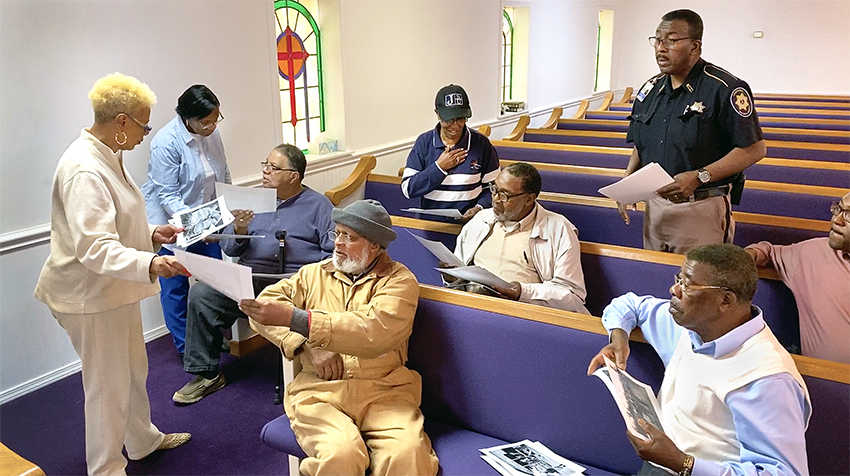
Upon arriving in Mississippi in 2020, my first stop was Magee’s Creek Missionary Baptist Church. It was one of the Black churches we had visited years ago. Mississippi NAACP arranged for a meeting with pastors from various churches and elders from the Walthall County area. I brought along a complete set of photos I had taken in 1965 which stimulated great interest. Even though 55 years had passed, several folks discovered relatives and details of their past in the images that brought joy to them. Some images of past segregation, not so much.
1/27

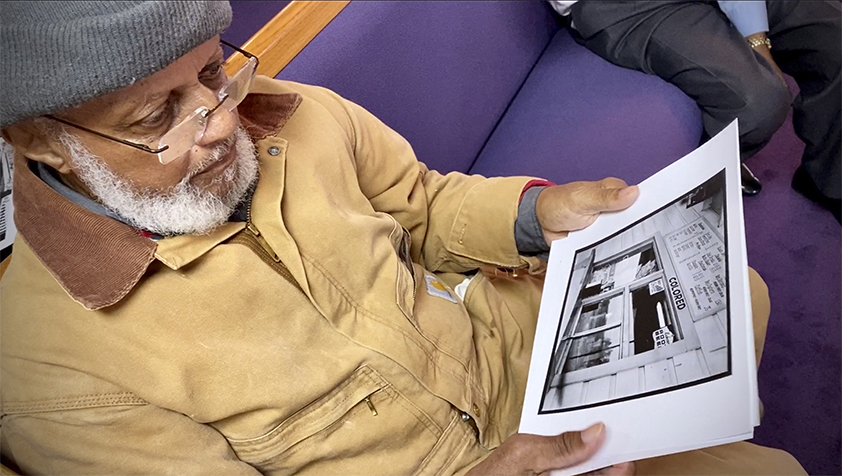
Magee’s Creek Missionary Baptist Church, Tylertown, MS 2020
As the elders in Magee’s Creek M.B. Church studied the photos of their town’s segregated past there was a sense of quiet reflection. For them and their ancestors who had personally endured so many indignities of the racial divide for about 400 years in America, it was not only a moral outrage as it has been for me, it has also been their daily lived experience.
2/27


Reverend George and Annette Coney, Magee’s Creek Missionary Baptist Church, Tylertown, MS, 2020
3/27

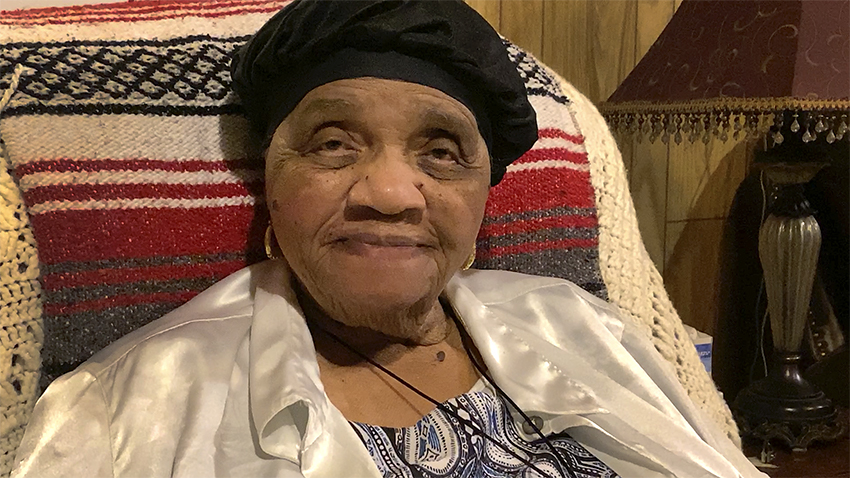
Floree Smith, age 97, early community activist, past chapter president NAACP, Walthall County, MS 2020
“I grew up in a sharecropper’s home. We didn’t own anything. Whatever we made we had to give half to the owners. It was a terrible time. They lynched my friend. They say he was liking a White woman. They threw him on the porch. I saw the body, it looked like hamburger meat...”
“It was terrible to be denied the right to vote. I went to register a lot of times. You had to stand up to them. It was a struggle, but I just stuck with it, it didn’t bother me all. They tried to shut me up, but I wouldn’t shut up. When the time came I just stepped right in. The Lord gave me the energy. I got to vote in the 1950’s before the Voting Rights Act in 1965.” [Only 6% of Blacks in Mississippi could vote prior to the Act.]
“Before, we had to stay back on voting day. People were just layin’ low, we weren’t around the voting precinct at all. They were trying keep us in our place. They would threaten us, ‘If you go vote I’m not gonna pay you [your salary]!’“
“After the Voting Rights Act it was a different story. They would come to our house and beg for our vote. ‘We will give you anything you want today.’ I said, ‘No, I don’t want anything you have. I just want to cast my vote.’ And we were ready. We were always there when the polls opened. I just wanted a slice of the pie —not the whole thing…”
4/27

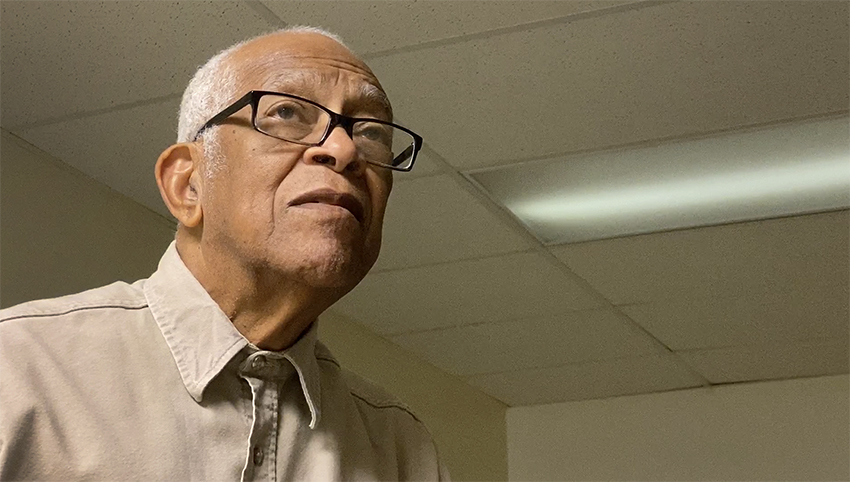
Brother Hollis Watkins, civil rights and social justice worker, Jackson, MS 2020
“I started this work when I was 19. Now I’m 78 and still going… trying to do what I can where I can to improve conditions that should have been made better a long time ago. I can’t stop now...”
“Blacks were not given the right to register or vote. [growing up] You had to pass a literacy test. Whites came to register, they just gave their name and address and they passed. For Blacks, they gave you a test that was ridiculous! It may have had questions such as, ‘How many grains of sand is there in a pint jar? Who can tell me how many bubbles can be made from this bar of soap?’ It wasn’t about right or wrong answers but how they felt about you. It was about racism. We had to register but at the same time do away with racism…”
“Our initial work was in voter registration and at lesser degree to be able to be served at lunch counters… I was arrested and put in jail for going to a lunch counter and attempting to buy a cup of coffee...
I spent 34 days in jail…”
“Fear is still one of the big issues in voter suppression in Mississippi … Many [Blacks] have not been raised to see that they are the ones for the most part that they are in control…”
5/27

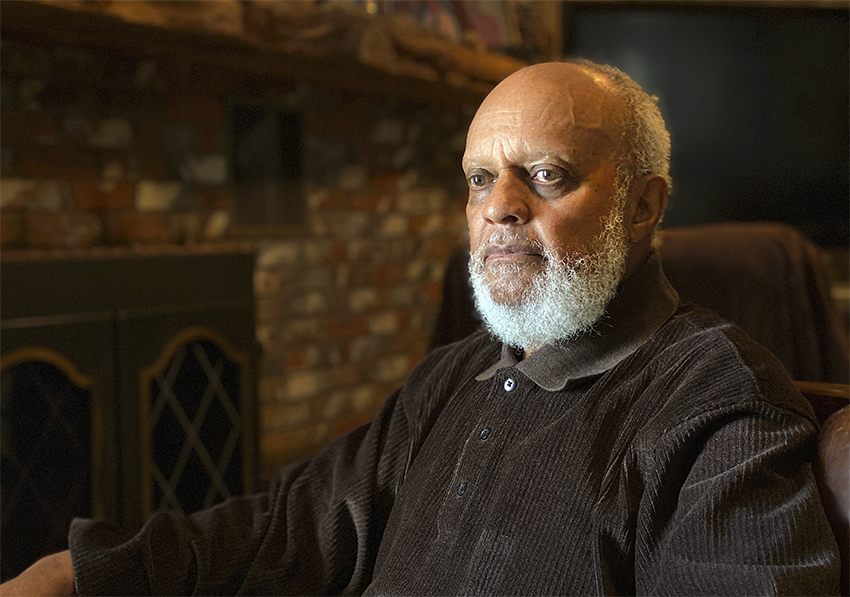
Bytha Magee II, church elder, farmer, Tylertown, MS 2020
“The poll tax had to be paid up 2 years in advance. My grandfather used to haul gravel for the roads where the Blacks lived… He’d go to the gravel pits and then spread it out. That’s the way he paid his poll tax. He had to work maybe a week for free…”
“Keeping us from voting was a good way to keep us powerless, to keep us down, to keep us behind them… After the Voting Rights Act you could go to a lot of different places that you couldn’t go before. A lot of Blacks kept their money at home. After, you could go to any bank you wanted to. After the Voting Rights Act you had more power and Blacks started running for office…”
”I saw very little difference after the rollback of the Voting Rights Act in 2013 because most of the White people still held most of the top elected offices in the county or state…“
“A lot of our Blacks, they just won’t vote. Some will say, ‘Well, the white man will do what he wants to do anyway!’ ...Yeah, as long as you don’t vote! If you don’t fight for what’s yours nobody’s gonna walk up and give it to you…!”
6/27

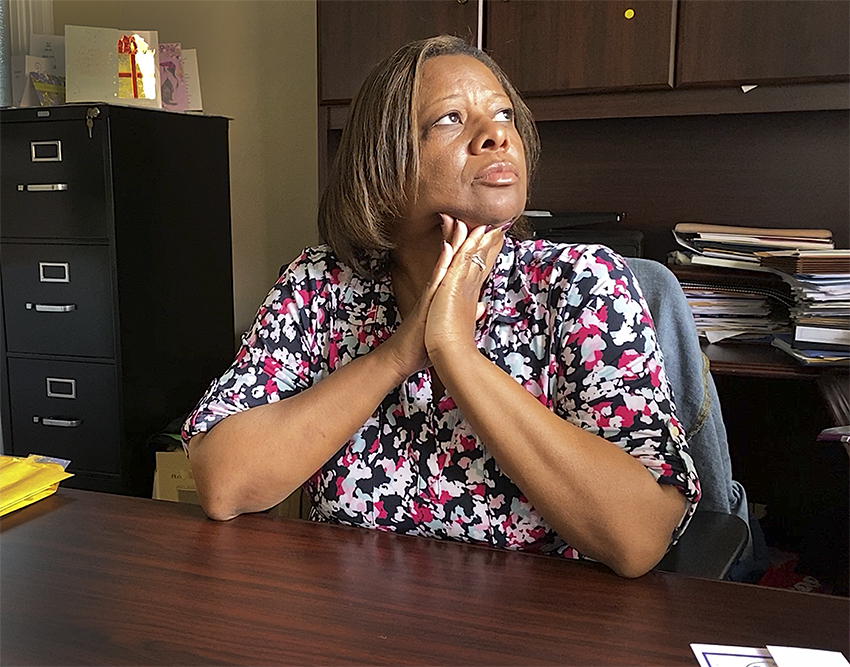
Nsombi Lambright-Haynes, Director of Mississippi Votes, voting rights advocate, Jackson, MS 2020
“Voter ID laws have become another intimidation tactic to keep people away from the polling place. People have lost their lives in Mississippi just for the right to register to vote. Since we have had the right to vote it has continued to be an uphill battle to make sure those suffrage rights are honored and respected.”
“If the mailing address on the voter’s license doesn’t match what’s in the polling books they can’t vote or they have to vote someplace else or vote by affidavit ballot. A hyphenated name from a marriage, misspelling of names, not to mention the issues with the transgender community being able to vote in MS…! There are places where people don’t drive so they don’t have a valid driver’s license. They have to come to the capitol, Jackson to get a state issued ID and don't have adequate transportation to get there.”
MS Votes, Mississippi NAACP and others have a hotline people call for help if they have trouble voting at the polls. In the last statewide election they got about 300 calls.
7/27

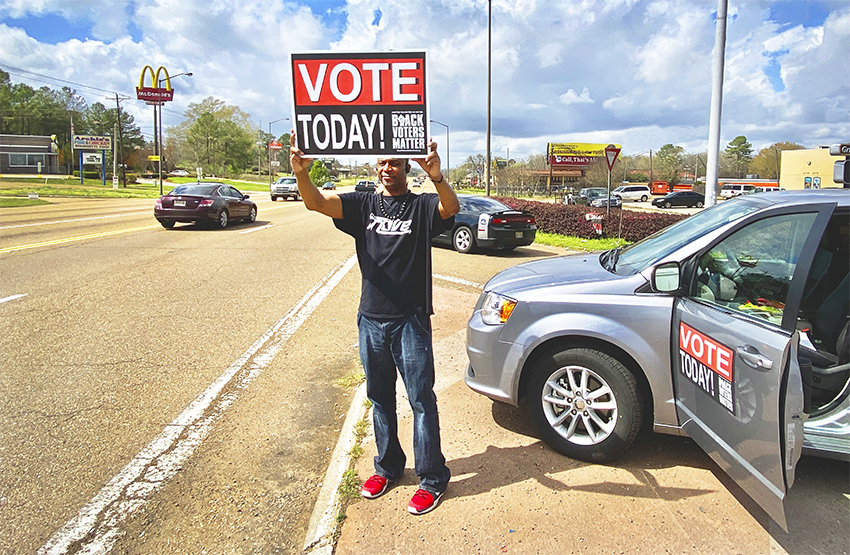
Leonard McCloud, organizer, Mississippi MOVE, Jackson, MS • Primary Day, 2020
I was visiting polling stations on Primary Day in Jackson when I stopped to ask Leonard about young voters. Who chooses to vote and who doesn’t these days in Mississippi? What he said was not comforting: Many poor people are not interested in the electoral process.
“A lady told me yesterday, ‘My vote don’t count.’ I said, ‘your vote does count!’ ‘Well, I‘m not gonna vote anyway.’ A lot of people don’t even know there’s an election, they are bombarded by life...”
“A lot of them think politicians just don’t care and are not going to do anything and so they’re fed up with the system. They just don’t care..!”
8/27

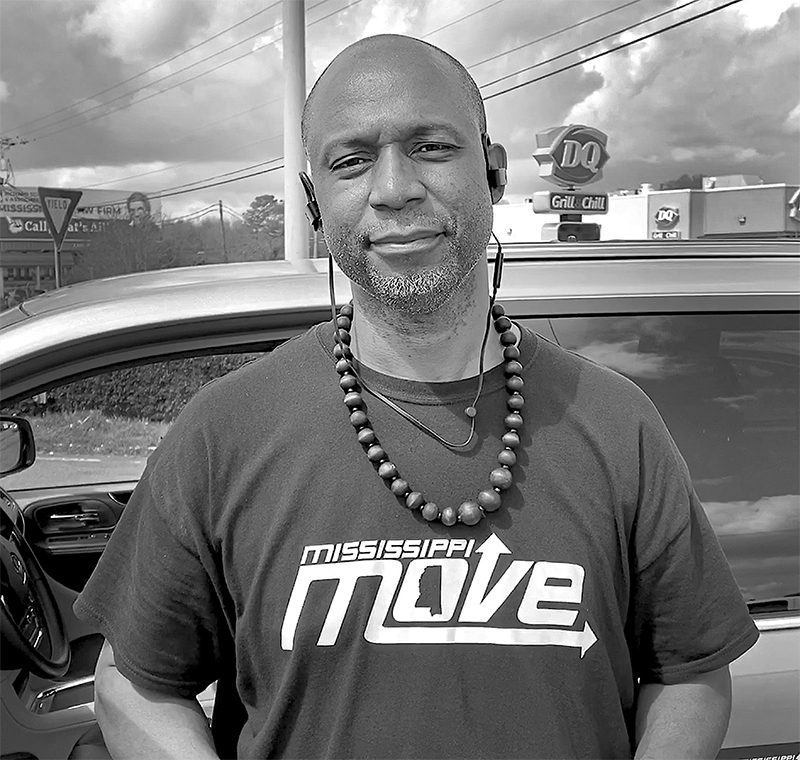
Leonard McCloud, Mississippi MOVE, Jackson, MS 2020
“I’m just being honest... Many young people don’t care about no Martin Luther King, Emmet Till, or Fanny Lou Hamer. They’re caught up in the fast life, I call it ‘the hip hop generation.’ They’re letting the streets raise them. They’re dropping out of school, in and out of prison, gang activity, drugs, trying to be like the rappers on TV, basketball, that’s all they think about. That’s because there’s no one there to teach them. Single parent mothers trying to raise them the best they can. This generation is being lost...”
“I don’t like to mix religion and politics, but God has to be in the picture somewhere! If we don’t do things with our hearts, with compassion, we are not gonna get things done.”
9/27

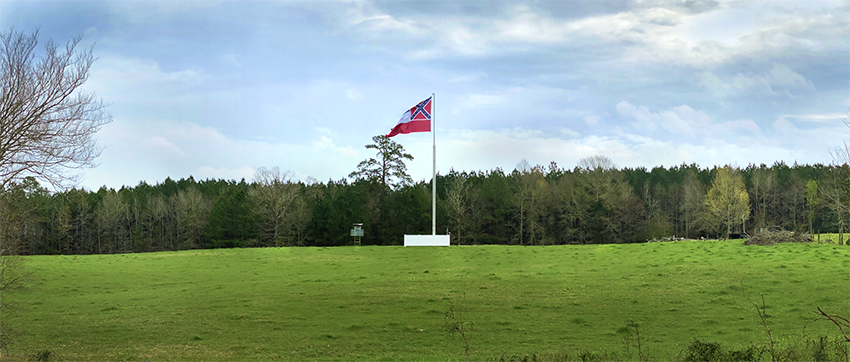
Mississippi state flag, Lincoln County, MS, March, 2020.
Mississippi was the last state to have the Confederate symbol on their flag. The flag had flown in the state since 1894. Largely as a consequence of the nationwide George Floyd/Black Lives Matter protests, on June 28, 2020, the Mississippi Legislature passed a bill mandating the removal of the state flag from public buildings. It established a commission to design a replacement that would exclude the Confederate battle flag and include the U.S. national motto "In God We Trust." It was signed into law on June 30, 2020. As one legislator said, the train had left the station and become “the train of unification.”
10/27

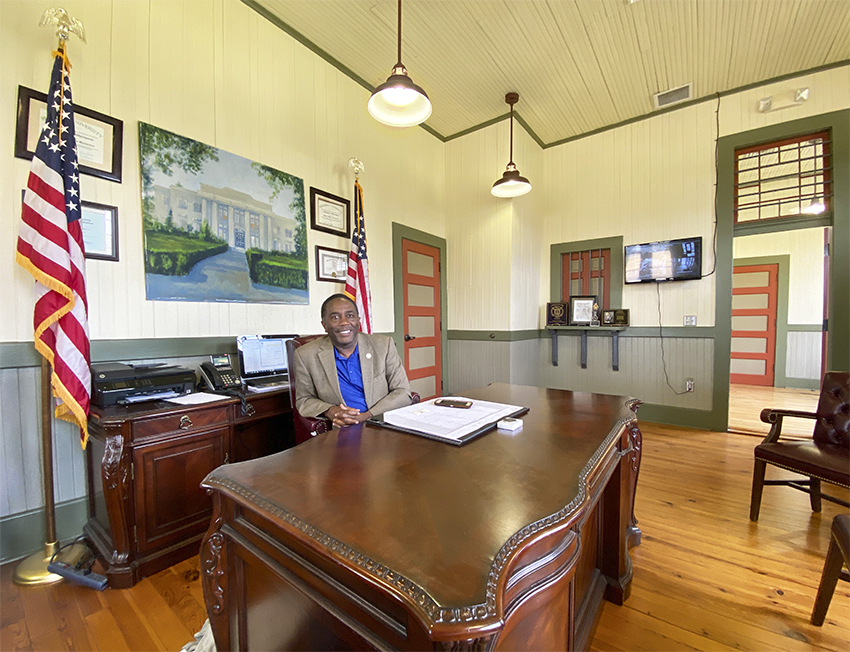
Mayor Anthony Witherspoon, Magnolia, Mississippi, 2020.
Ex-felon, now president of the Mississippi Conference of Black Mayors, he represents a new breed of progressive elected officials in a not very progressive state. He is presently a PhD candidate having taken advantage of his 6 years in prison to study and challenge voter rights laws for felons and ex-felons (”returning citizens”) in Mississippi. He challenged the state to regain the right to vote and won. Soon after, the state doubled the number of felonies that bar ex-felons from ever voting again.
When the Magnolia City Hall moved into the old railroad station Mayor Witherspoon chose this room, the old Colored-only waiting room.
11/27

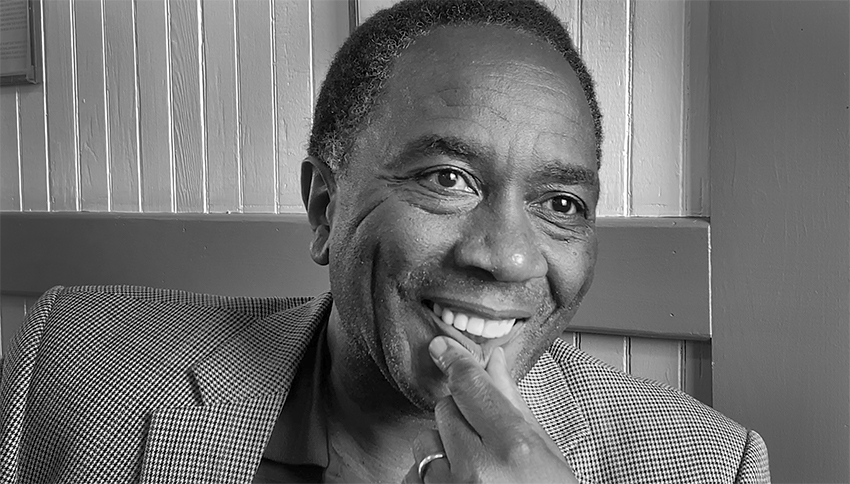
Anthony Witherspoon, Mayor, Magnolia, MS 2020
”Mississippi has the 2nd highest incarceration rate per capita in the U.S. Black males make up 65% of the disenfranchisement by way of felony conviction. This is voter suppression at its best!”
“Simply put, if a person has paid their debt to society, served their time, once they have done that and are free they should have a voice on what happens in their lives, their children’s lives and their household. I’m for full restoration of rights after your time is served. ...Or else just say that you sentenced them for life!”
12/27

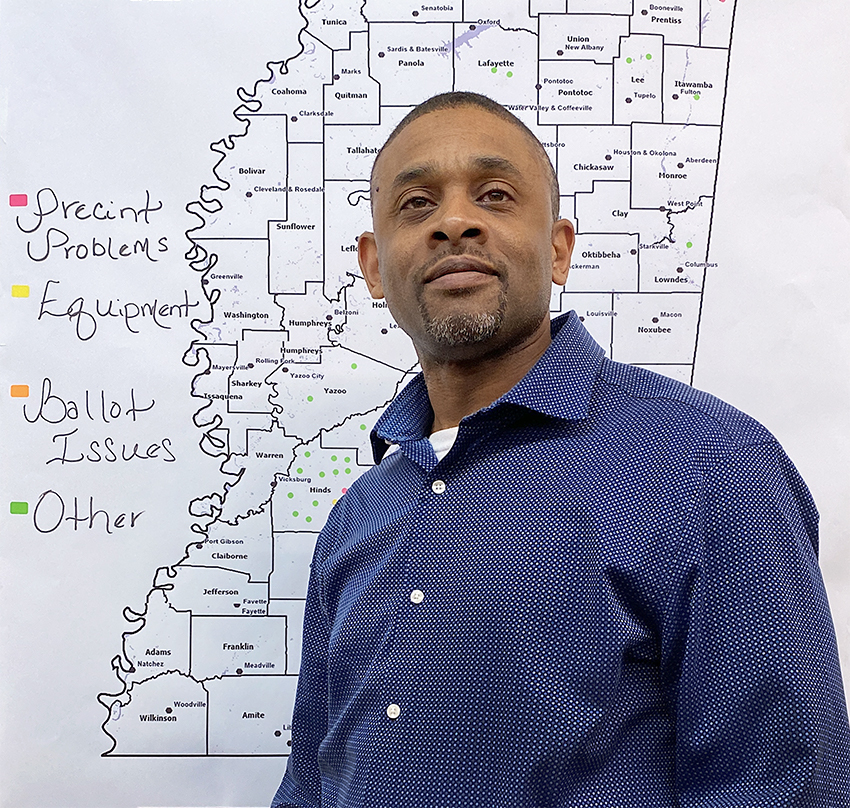
Omar Travis, voting rights advocate for prisoners and returning citizens, Jackson, MS 2020
“I had a great father, very active in getting Black people the right to vote, a father who risked his freedom, nights in jail, even being shot trying to get other people to vote. I saw his sacrifices through the years, but I still made bad choices in my life…”
“So now I want to get involved as my father was, to let men have the right to vote even though they have committed felonies, but think they don’t have the right to vote even though they legally do. I’m trying to get other men not to squander the sacrifices my father made that I squandered…”
There are presently 21 specific felony charges that bar you from voting in Mississippi. Apart from these, men and women are eligible to vote even while incarcerated. Most are not informed of this right to vote. Omar lost his right to vote for receiving stolen property. He has devoted his life to educating people convicted of crimes about their legal rights to vote.
13/27

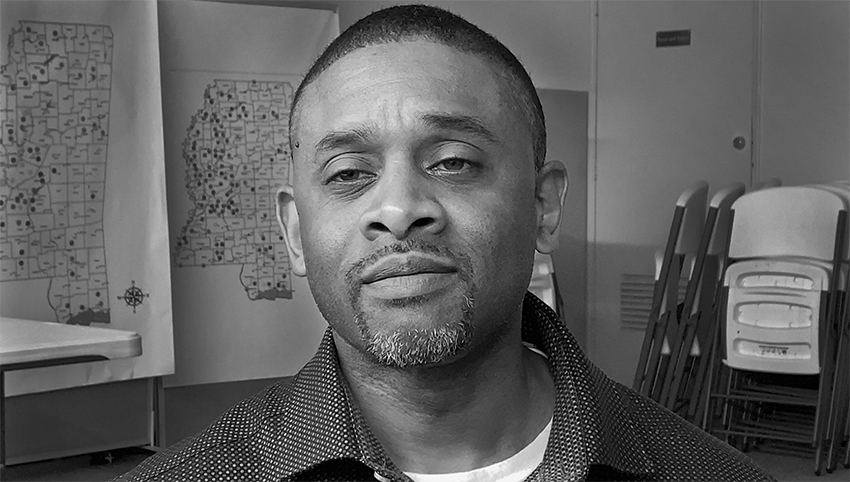
Omar Travis, Jackson, MS, 2020
“The term is returning citizen. It’s also used in the Mississippi Department of Corrections. It is a way of helping ex-prisoners understand and have a better outlook on life. It’s a psychological term, it helps them to see themselves as more than just a criminal, a felon, more than just someone who has been left behind. It carries a tone, that we want you in our community...but we just don’t want your vote..!”
“We still have a system that is racially driven and this system is trying to make persons who have perpetrated crimes [and done their time] not count. What is a way to make that person not count? You can take their taxes and but not give them a right to vote. America was founded on resisting taxation without representation. That same system of injustice is still here.”
“If we are calling folks returning citizens then they should have all the rights of citizenship. When we fail to give them the rights that citizens have then they will revert back to other avenues to express themselves. Given certain circumstances many people would make bad choices…”
14/27

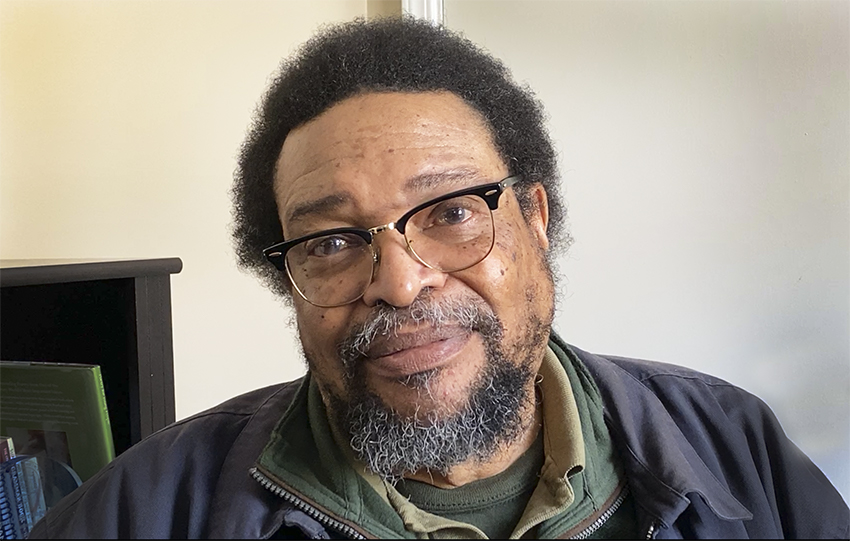
Frank Figgers, legacy preservation, civic engagement consultant, One Voice, Jackson, MS, 2020
“Before the Voting Rights Act there was no system of government that Blacks could rely on for justice… No protection for justice, no voice, nobody you could go to to say, ‘I'm having some trouble here and I need some help.’ There was nobody there... You were left out. That’s what it was like.”
Mississippi has no early voting, no same day registration, no online registration, no automatic voter registration, no “no-excuse” absentee voting, [only 6 excuses qualify]. A state approved photo ID is required. You must show up to vote only on election day.
”Their strategy is to reduce the number of ways people can go vote. Why would you limit how people participate? Why only one day to vote?” Why shave off hundreds of people who would vote…?”
15/27

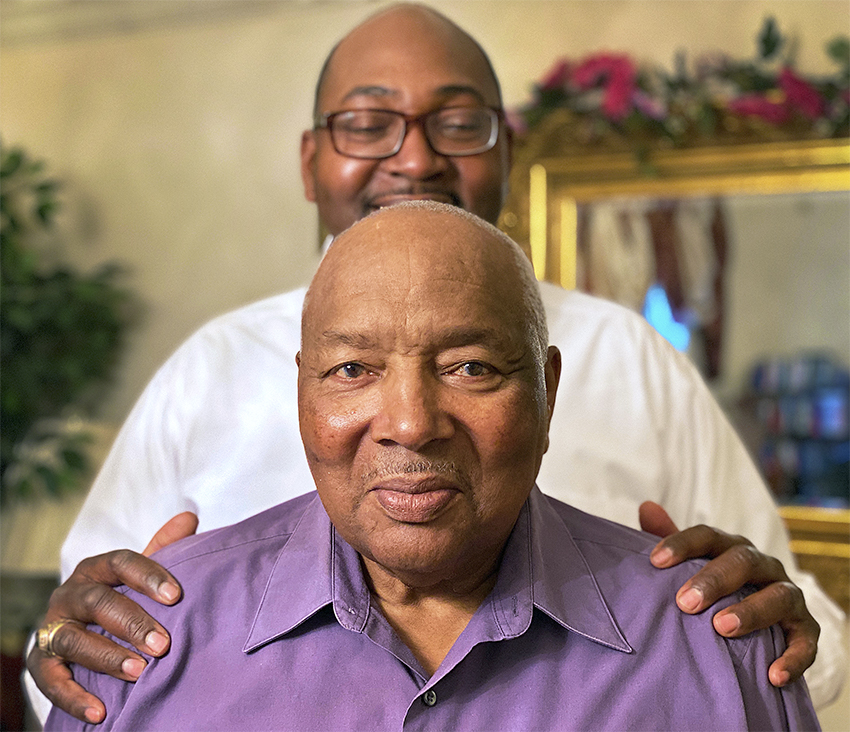
Reverend RT McGowan with son, Reverend Darrick McGowan, Foxworth, MS, 2020
“I’ve been part of the NAACP for more than 50 years. In the beginning Black folk were afraid to be a part of it and if you were they’d lay you off your work. You couldn’t get a job. We all had White bosses…”
“The Voting Rights Act made a great change. Ministers, pastors, preachers played a great role in getting folk out to vote. The church was the only thing we owned. And that’s where we gathered...”
“After Martin Luther King was killed in 1968 we marched. A thousand Black folk went down Main Street arm in arm. Store owners locked the stores and went up to their roofs. They had never seen that before. It made a big difference. A local reverend said, “You all got a crack in the door. Don’t let the door close...!” That taught the Black folks here to get together. We started to block vote…“
16/27

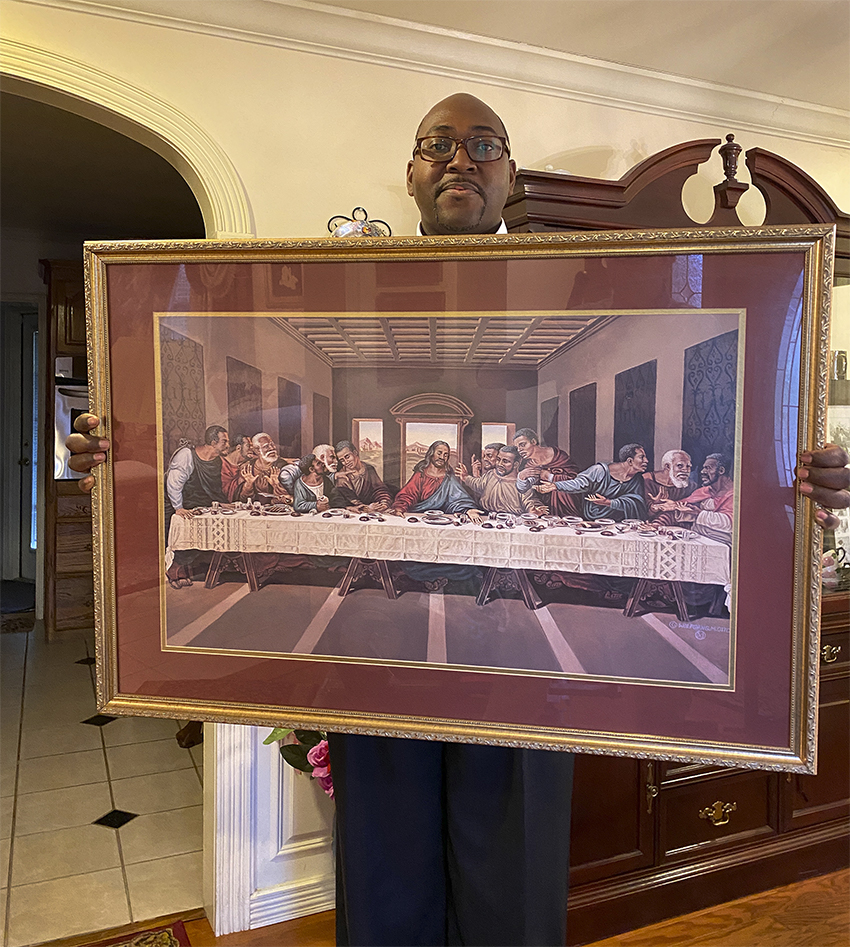
Reverend Darrick McGowan, Foxworth, MS 2020
17/27

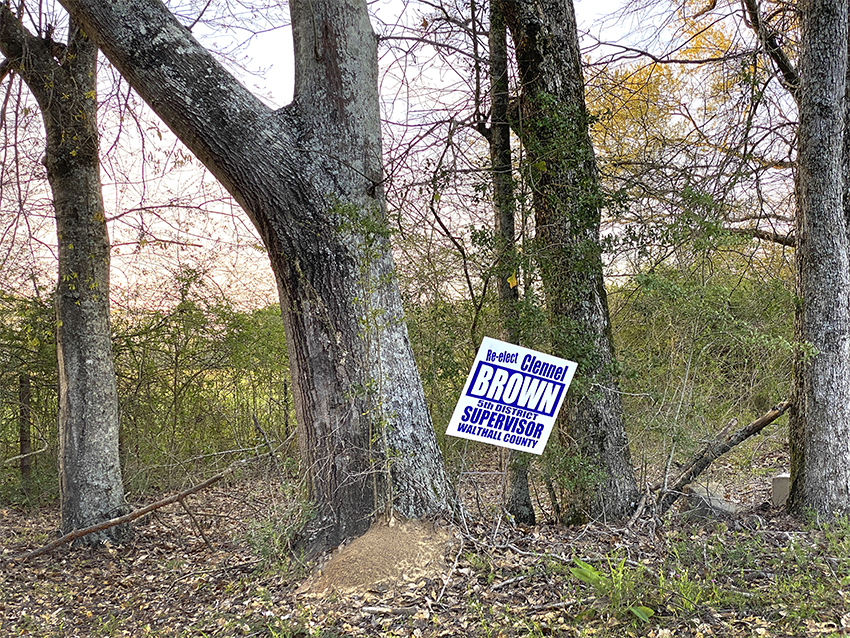
Before the 1965 Voting Rights Act only 6% of Blacks were allowed to vote in Mississippi and there were no Black elected officials in the state. Now there are more than 60 Black mayors in the state, 13 Black state senators, sheriffs and many local and county elected officials. Mississippi now has more Black elected officials than any other state in the US. But, Blacks are elected only in local, county and House district elections where there are majorities of Blacks. There has never been a statewide Black elected official ever.
Since Blacks account for less than 2/5 of the population it makes it nearly impossible to win an election to statewide office. Racial polarization and institutional racism are “baked in.”
Clennel Brown is the only non-White Supervisor out of 5 in Walthall County where the Black population is 43%.
18/27

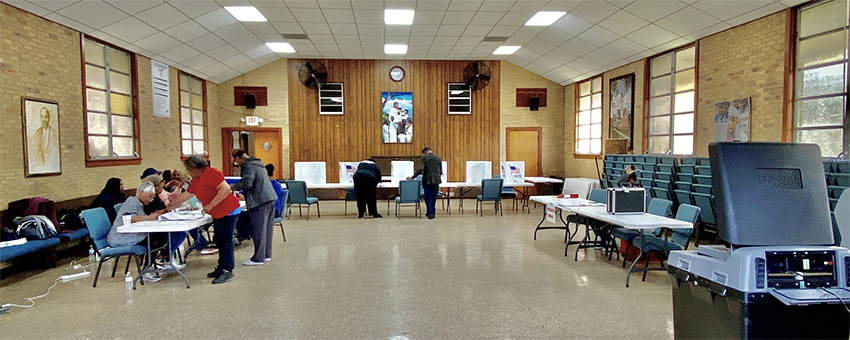
Precinct 58, Jackson, MS Primary Day, 2020
Mississippi votes reliably Republican. But in Jackson, 80% of the residents are Black and vote reliably Democratic.
I visited Precinct 58 on Primary Day. On the left were ballots for Democrats, on the right ballots for Republicans. I was told there were only about a dozen registered Republicans out of over 1000 total voters in the Precinct. The Republican poll worker was never even given the key to the case that contained Republican ballots so it sat unopened on the table all day. No one in the room seemed perturbed.
19/27


Biden primary celebration party at Johnny T’s Bistro, Jackson, MS • March 10, 2020
Joe Biden won 81%, Bernie Sanders 15%. Biden also won every county in Mississippi. Why?
I was told that Biden cares for and understands Blacks more than Bernie. Biden made three appearances in Black venues in the days leading up to the election, Bernie cancelled his only appearance. Biden also won Black voters by large margins across the South.
84 percent of potential Democratic primary voters in Mississippi are Black. They tend to be more conservative, with 50 percent describing themselves as moderates, 25 percent as somewhat liberal and only 25 percent as very liberal.
20/27

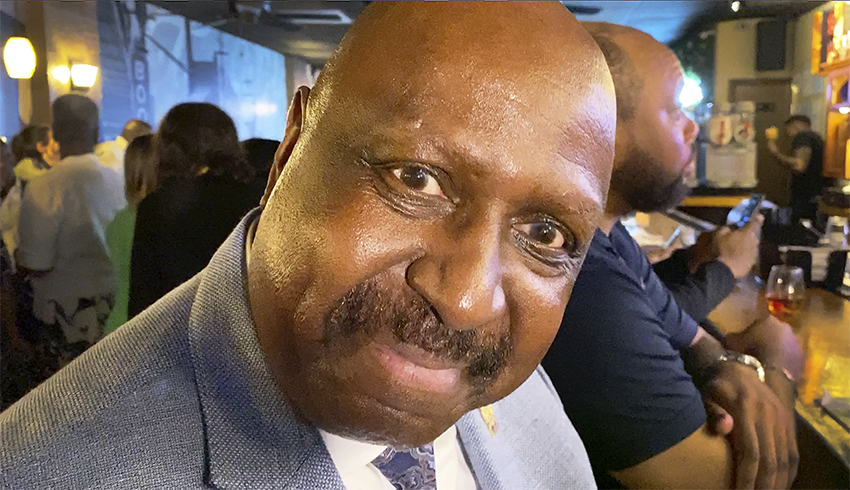
Warren Jones, MD, retired family and adolescent medicine physician, past president of the American Academy of Family Physicians, living in Mississippi since 2001
“In Mississippi they look at you in terms of electorate as race first, party second, whether you are from Mississippi third, and whether your family has money fourth. If you don’t fit those 4 priorities then your chances of being elected statewide here are about a chance of a snowball in hell...!”
“As I travel the country speaking, every place I go there is a doctor from Mississippi. My question to them is, why are you here instead of back in Mississippi? They talk about the horrible environment here [as a Black person]... We’ve got to find a way to cut off our brain drain and keep our best and brightest here to make a difference for everyone…”
21/27

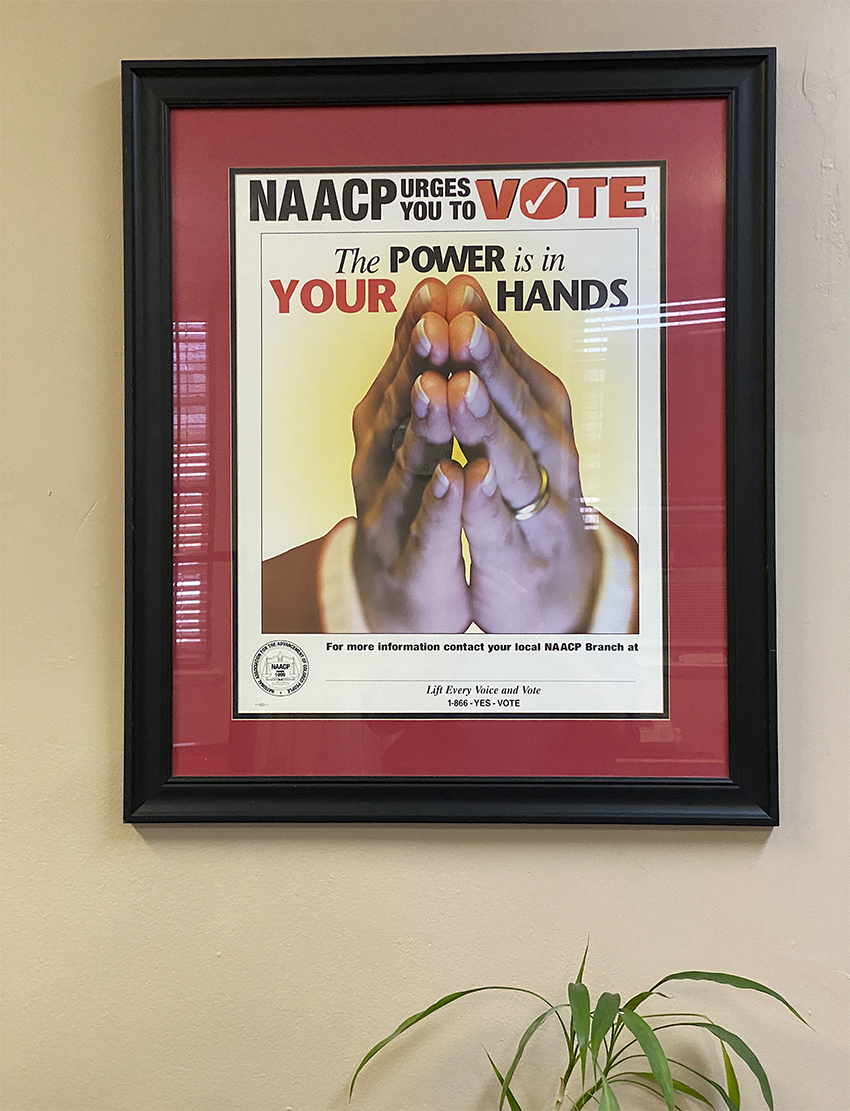
Mississippi NAACP office, Jackson, MS, 2020
22/27

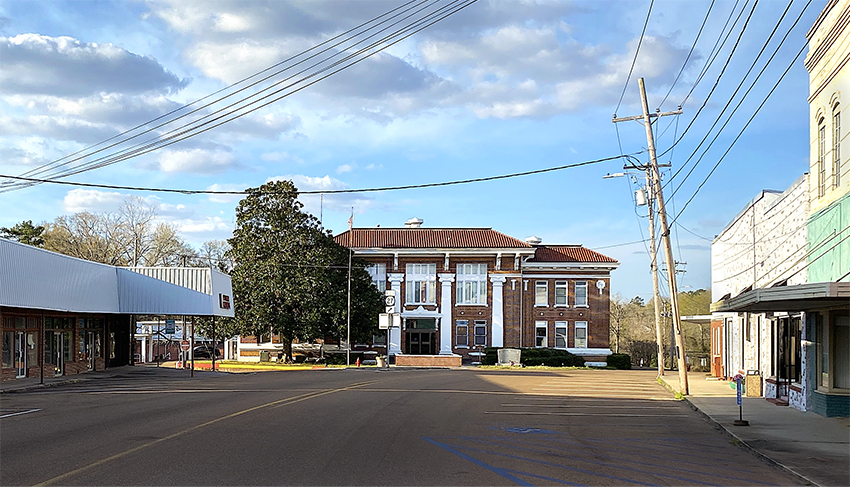
Walthall County Courthouse, downtown Tylertown, MS, 2020
Elements of Jim Crow laws and institutional racism still persist in Mississippi. In 1890 White politicians set a new high bar which in effect sidelined Black chances of winning statewide elections. To win election for governor or other statewide elected office a candidate must get more than 50% of the popular vote and a majority (62) of the state’s 122 House districts.
Generally in Mississippi, Black = Democrat and White = Republican. Whites outnumber Blacks 59% to 38% of the population. Blacks constitute a majority of voters in only 42 out of the 122 House districts making it almost impossible to win a statewide election for any office. And they never have since Reconstruction.
A simple solution would be to do what most other states do: Count all the votes and whoever has the greatest number of votes wins. Redrawing the state’s House districts could also help. Presently this is unlikely, because the party in charge of the state legislature draws the district lines and set the voting rules...and they like it as it is.
23/27

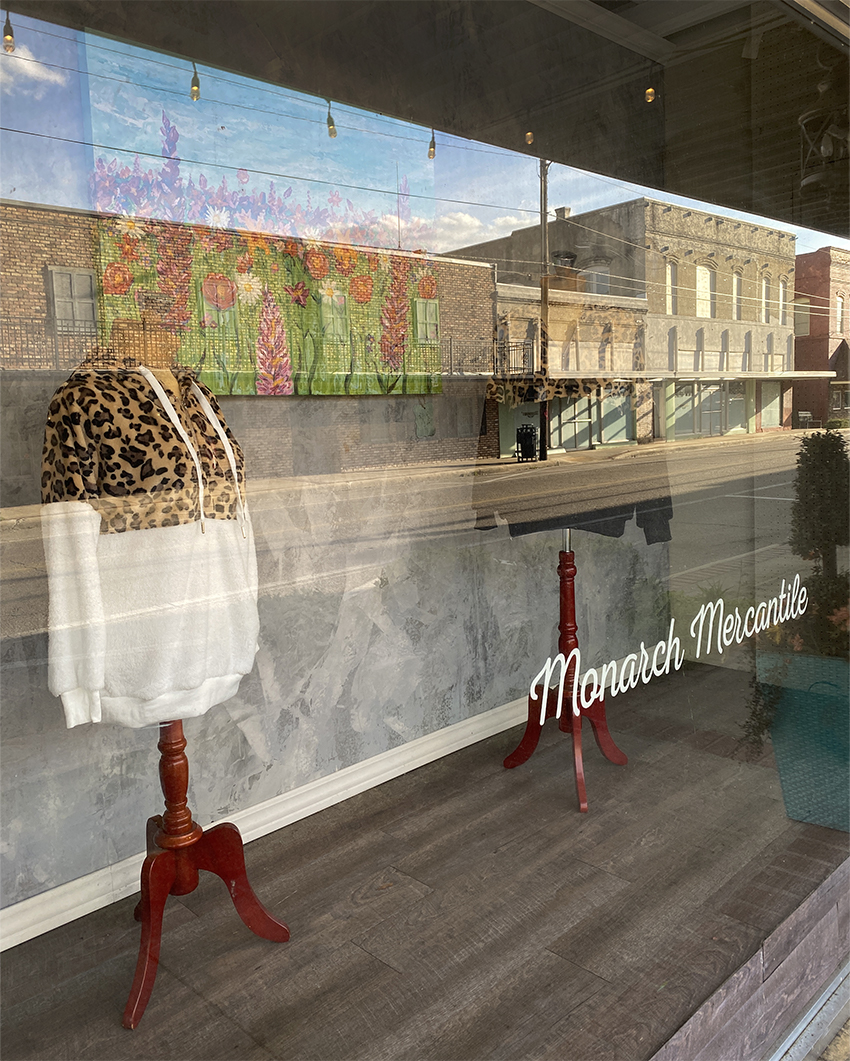
Storefront, downtown Tylertown, Walthall County, MS 2020
Economic growth in Walthall County has been flat for years. Where cotton was once king, it was replaced by pine cultivation and then replaced by manufacturing, retail trade and construction. Some Blacks left for better education, better pay and opportunities in cities and in the North. The population of Walthall County has dropped by about 7% since 2010. Hurricane Katrina in 2005 severely damaged downtown businesses and some were not able to recover. When the State of Mississippi moved the main road 2 miles out of Tylertown it dealt a further blow to the town economy. The median family income in the county is 50% of the U.S. average. Still, the spirit of the people in this community persists!
24/27

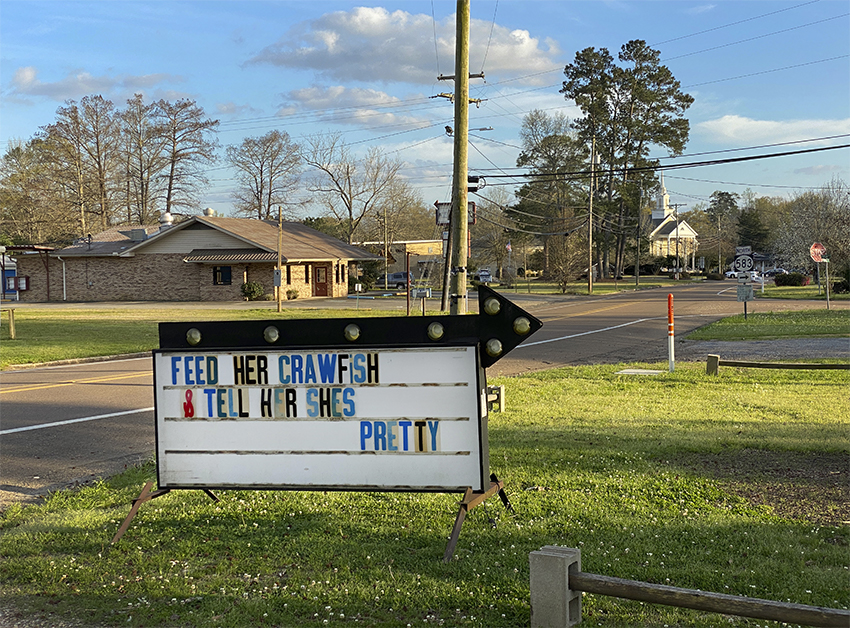
Take-out restaurant sign featuring a favorite southern comfort food, Tylertown, MS 2020
25/27

DOES MY VOICE COUNT?
Voter Suppression Then and Now
The vote is the voice, the breath, the spirit,
a great power that invigorates the quality of life in a democracy.
A democracy is a living organism. Democracy allows, even encourages different world views. It thrives and is vital only when all of its parts harmoniously function and communicate together. Silence one part and the organism can never be fully healthy.
Does My Voice Count? documents two visits to Mississippi with a common theme: voter suppression. It is divided by time and political realities: The first trip was in 1965, a time immediately after the passage of the Voting Rights Act, which protected mainly southern Blacks from institutional disenfranchisement and racism in voting. As a 19 year old privileged, middle class White, I was invited into the lives of many Black persons and families as a guest in their community, to help them register to vote for the first time.
In March, 2020, I went back to Mississippi to find out what had changed in their lives. It was seven years after the 2013 Supreme Court decision to roll back a key provision of the Act thus gutting its heart and soul. The rollback instantly opened the floodgates of evermore ingenious, deliberate and unjust ways to suppress the vote of an even greater number of people of color, minorities, the poor and disadvantaged.
___
It’s not only about politics. Voter suppression is usually thought of as a strictly political issue. Historically, all parties are guilty of this tactic: the party that controls local, county and state legislatures writes the rules for voting. Presently the majority of state legislatures in the U.S. are Republican controlled.
If we care about preserving our democracy, isn’t it time we reflect and act on this simple rule: Treat each other as we would like to be treated? Has this perennial ideal that makes for a vitally functioning society fallen woefully by the wayside? Doesn’t true justice begin here?
In my view, only political strategies and actions grounded in moral courage, compassion, kindness and wisdom will give us the contentment that our human collective seeks and needs.
Jim Lemkin
26/27
THE RETURN: 55 years later, what’s changed?
In March 2020 I returned to Mississippi wanting to come full circle, to return to the county I had visited 55 years before and to hear what had changed for members of the Black community. I set out to learn what kinds of voter suppression persist today in Mississippi, what life in Mississippi was like before the Voting Rights Act, and what difference the rollback of the Act made to Mississippians…
Equipped with an iPhone, I traveled between Walthall County [located near the Louisiana border] and Jackson, the state capital, filming interviews and talking with voting rights and civil rights activists, community organizers, church elders and others committed to the advancement of their people. Many of the photographs are images from the video interviews. As much as possible, quotes that accompany each portrait are transcriptions of the person’s own words.
Without the generosity and kindness of the Mississippi NAACP, One Voice, Magee’s Creek M.B. Church, Mississippi Move, Mississippi ACLU and a host of other generous and committed folks, this part of the exhibit would not have happened.
————
The 1965 Voting Rights Act ensured that state and local governments couldn’t deny their citizens the equal right to vote based on their race, color, or membership in a minority language group. After the Act, states with histories of egregious voting discrimination needed federal approval or “preclearance” before changes could be made in their state’s voting laws. This provision in the Act had the profound effect of halting further efforts by mainly southern states to block access to the ballot.
The Voting Rights Act worked remarkably well for 48 years. Within two years after passage, for example, the number of Mississippi Blacks who were registered went from about 6% to 60%! All was well, until…
In 2013, the U.S. Supreme Court ruling in Shelby v Holder struck down a key provision — the very heart and soul of the Voting Rights Act. This rollback gave every state free reign to alter the voting laws and suppress the votes of any group of its citizens they wished. Since then, more than 25 states have enacted new voting obstacles including: • strict photo ID requirements for registering and voting, • purging voters from the rolls, • reducing early voting • new registration obstacles, • changing district boundaries, • closing hundreds of polling stations, • mail-in ballot restrictions, • ex-felon (returning citizen) restrictions, etc. Unfortunately, the list grows longer all the time and affects people of color, the poor, elderly and disadvantaged the most.

Upon arriving in Mississippi in 2020, my first stop was Magee’s Creek Missionary Baptist Church. It was one of the Black churches we had visited years ago. Mississippi NAACP arranged for a meeting with pastors from various churches and elders from the Walthall County area. I brought along a complete set of photos I had taken in 1965 which stimulated great interest. Even though 55 years had passed, several folks discovered relatives and details of their past in the images that brought joy to them. Some images of past segregation, not so much.
1/27


Magee’s Creek Missionary Baptist Church, Tylertown, MS 2020
As the elders in Magee’s Creek M.B. Church studied the photos of their town’s segregated past there was a sense of quiet reflection. For them and their ancestors who had personally endured so many indignities of the racial divide for about 400 years in America, it was not only a moral outrage as it has been for me, it has also been their daily lived experience.
2/27


Reverend George and Annette Coney, Magee’s Creek Missionary Baptist Church, Tylertown, MS, 2020
3/27


Reverend George and Annette Coney, Magee’s Creek Missionary Baptist Church, Tylertown, MS, 2020
3/27


Floree Smith, age 97, early community activist, past chapter president NAACP, Walthall County, MS 2020
“I grew up in a sharecropper’s home. We didn’t own anything. Whatever we made we had to give half to the owners. It was a terrible time. They lynched my friend. They say he was liking a White woman. They threw him on the porch. I saw the body, it looked like hamburger meat...”
“It was terrible to be denied the right to vote. I went to register a lot of times. You had to stand up to them. It was a struggle, but I just stuck with it, it didn’t bother me all. They tried to shut me up, but I wouldn’t shut up. When the time came I just stepped right in. The Lord gave me the energy. I got to vote in the 1950’s before the Voting Rights Act in 1965.” [Only 6% of Blacks in Mississippi could vote prior to the Act.]
“Before, we had to stay back on voting day. People were just layin’ low, we weren’t around the voting precinct at all. They were trying keep us in our place. They would threaten us, ‘If you go vote I’m not gonna pay you [your salary]!’“
“After the Voting Rights Act it was a different story. They would come to our house and beg for our vote. ‘We will give you anything you want today.’ I said, ‘No, I don’t want anything you have. I just want to cast my vote.’ And we were ready. We were always there when the polls opened. I just wanted a slice of the pie —not the whole thing…”
4/27


Brother Hollis Watkins, civil rights and social justice worker, Jackson, MS 2020
“I started this work when I was 19. Now I’m 78 and still going… trying to do what I can where I can to improve conditions that should have been made better a long time ago. I can’t stop now...”
“Blacks were not given the right to register or vote. [growing up] You had to pass a literacy test. Whites came to register, they just gave their name and address and they passed. For Blacks, they gave you a test that was ridiculous! It may have had questions such as, ‘How many grains of sand is there in a pint jar? Who can tell me how many bubbles can be made from this bar of soap?’ It wasn’t about right or wrong answers but how they felt about you. It was about racism. We had to register but at the same time do away with racism…”
“Our initial work was in voter registration and at lesser degree to be able to be served at lunch counters… I was arrested and put in jail for going to a lunch counter and attempting to buy a cup of coffee...
I spent 34 days in jail…”
“Fear is still one of the big issues in voter suppression in Mississippi … Many [Blacks] have not been raised to see that they are the ones for the most part that they are in control…”
5/27


Bytha Magee II, church elder, farmer, Tylertown, MS 2020
“The poll tax had to be paid up 2 years in advance. My grandfather used to haul gravel for the roads where the Blacks lived… He’d go to the gravel pits and then spread it out. That’s the way he paid his poll tax. He had to work maybe a week for free…”
“Keeping us from voting was a good way to keep us powerless, to keep us down, to keep us behind them… After the Voting Rights Act you could go to a lot of different places that you couldn’t go before. A lot of Blacks kept their money at home. After, you could go to any bank you wanted to. After the Voting Rights Act you had more power and Blacks started running for office…”
”I saw very little difference after the rollback of the Voting Rights Act in 2013 because most of the White people still held most of the top elected offices in the county or state…“
“A lot of our Blacks, they just won’t vote. Some will say, ‘Well, the white man will do what he wants to do anyway!’ ...Yeah, as long as you don’t vote! If you don’t fight for what’s yours nobody’s gonna walk up and give it to you…!”
6/27


Nsombi Lambright-Haynes, Director of Mississippi Votes, voting rights advocate, Jackson, MS 2020
“Voter ID laws have become another intimidation tactic to keep people away from the polling place. People have lost their lives in Mississippi just for the right to register to vote. Since we have had the right to vote it has continued to be an uphill battle to make sure those suffrage rights are honored and respected.”
“If the mailing address on the voter’s license doesn’t match what’s in the polling books they can’t vote or they have to vote someplace else or vote by affidavit ballot. A hyphenated name from a marriage, misspelling of names, not to mention the issues with the transgender community being able to vote in MS…! There are places where people don’t drive so they don’t have a valid driver’s license. They have to come to the capitol, Jackson to get a state issued ID and don't have adequate transportation to get there.”
MS Votes, Mississippi NAACP and others have a hotline people call for help if they have trouble voting at the polls. In the last statewide election they got about 300 calls.
7/27


Leonard McCloud, organizer, Mississippi MOVE, Jackson, MS • Primary Day, 2020
I was visiting polling stations on Primary Day in Jackson when I stopped to ask Leonard about young voters. Who chooses to vote and who doesn’t these days in Mississippi? What he said was not comforting: Many poor people are not interested in the electoral process.
“A lady told me yesterday, ‘My vote don’t count.’ I said, ‘your vote does count!’ ‘Well, I‘m not gonna vote anyway.’ A lot of people don’t even know there’s an election, they are bombarded by life...”
“A lot of them think politicians just don’t care and are not going to do anything and so they’re fed up with the system. They just don’t care..!”
8/27


Leonard McCloud, Mississippi MOVE, Jackson, MS 2020
“I’m just being honest... Many young people don’t care about no Martin Luther King, Emmet Till, or Fanny Lou Hamer. They’re caught up in the fast life, I call it ‘the hip hop generation.’ They’re letting the streets raise them. They’re dropping out of school, in and out of prison, gang activity, drugs, trying to be like the rappers on TV, basketball, that’s all they think about. That’s because there’s no one there to teach them. Single parent mothers trying to raise them the best they can. This generation is being lost...”
“I don’t like to mix religion and politics, but God has to be in the picture somewhere! If we don’t do things with our hearts, with compassion, we are not gonna get things done.”
9/27


Mississippi state flag, Lincoln County, MS, March, 2020.
Mississippi was the last state to have the Confederate symbol on their flag. The flag had flown in the state since 1894. Largely as a consequence of the nationwide George Floyd/Black Lives Matter protests, on June 28, 2020, the Mississippi Legislature passed a bill mandating the removal of the state flag from public buildings. It established a commission to design a replacement that would exclude the Confederate battle flag and include the U.S. national motto "In God We Trust." It was signed into law on June 30, 2020. As one legislator said, the train had left the station and become “the train of unification.”
10/27


Mayor Anthony Witherspoon, Magnolia, Mississippi, 2020.
Ex-felon, now president of the Mississippi Conference of Black Mayors, he represents a new breed of progressive elected officials in a not very progressive state. He is presently a PhD candidate having taken advantage of his 6 years in prison to study and challenge voter rights laws for felons and ex-felons (”returning citizens”) in Mississippi. He challenged the state to regain the right to vote and won. Soon after, the state doubled the number of felonies that bar ex-felons from ever voting again.
When the Magnolia City Hall moved into the old railroad station Mayor Witherspoon chose this room, the old Colored-only waiting room.
11/27


Anthony Witherspoon, Mayor, Magnolia, MS 2020
”Mississippi has the 2nd highest incarceration rate per capita in the U.S. Black males make up 65% of the disenfranchisement by way of felony conviction. This is voter suppression at its best!”
“Simply put, if a person has paid their debt to society, served their time, once they have done that and are free they should have a voice on what happens in their lives, their children’s lives and their household. I’m for full restoration of rights after your time is served. ...Or else just say that you sentenced them for life!”
12/27


Omar Travis, voting rights advocate for prisoners and returning citizens, Jackson, MS 2020
“I had a great father, very active in getting Black people the right to vote, a father who risked his freedom, nights in jail, even being shot trying to get other people to vote. I saw his sacrifices through the years, but I still made bad choices in my life…”
“So now I want to get involved as my father was, to let men have the right to vote even thought they have committed felonies, but think they don’t have the right to vote even though they legally do. I’m trying to get other men not to squander the sacrifices my father made that I squandered…”
There are presently 21 specific felony charges that bar you from voting in Mississippi. Apart from these, men and women are eligible to vote even while incarcerated. Most are not informed of this right to vote. Omar lost his right to vote for receiving stolen property. He has devoted his life to educating people convicted of crimes about their legal rights to vote.
13/27


Omar Travis, Jackson, MS, 2020
“The term is returning citizen. It’s also used in the Mississippi Department of Corrections. It is a way of helping ex-prisoners understand and have a better outlook on life. It’s a psychological term, it helps them to see themselves as more than just a criminal, a felon, more than just someone who has been left behind. It carries a tone, that we want you in our community...but we just don’t want your vote..!”
“We still have a system that is racially driven and this system is trying to make persons who have perpetrated crimes [and done their time] not count. What is a way to make that person not count? You can take their taxes and but not give them a right to vote. America was founded on resisting taxation without representation. That same system of injustice is still here.”
“If we are calling folks returning citizens then they should have all the rights of citizenship. When we fail to give them the rights that citizens have then they will revert back to other avenues to express themselves. Given certain circumstances many people would make bad choices…”
14/27


Frank Figgers, legacy preservation, civic engagement consultant, One Voice, Jackson, MS, 2020
“Before the Voting Rights Act there was no system of government that Blacks could rely on for justice… No protection for justice, no voice, nobody you could go to to say, ‘I'm having some trouble here and I need some help.’ There was nobody there... You were left out. That’s what it was like.”
Mississippi has no early voting, no same day registration, no online registration, no automatic voter registration, no “no-excuse” absentee voting, [only 6 excuses qualify]. A state approved photo ID is required. You must show up to vote only on election day.
”Their strategy is to reduce the number of ways people can go vote. Why would you limit how people participate? Why only one day to vote?” Why shave off hundreds of people who would vote…?”
15/27


Reverend RT McGowan with son, Reverend Darrick McGowan, Foxworth, MS, 2020
“I’ve been part of the NAACP for more than 50 years. In the beginning Black folk were afraid to be a part of it and if you were they’d lay you off your work. You couldn’t get a job. We all had White bosses…”
“The Voting Rights Act made a great change. Ministers, pastors, preachers played a great role in getting folk out to vote. The church was the only thing we owned. And that’s where we gathered...”
“After Martin Luther King was killed in 1968 we marched. A thousand Black folk went down Main Street arm in arm. Store owners locked the stores and went up to their roofs. They had never seen that before. It made a big difference. A local reverend said, “You all got a crack in the door. Don’t let the door close...!” That taught the Black folks here to get together. We started to block vote…“
16/27


Reverend Darrick McGowan, Foxworth, MS 2020
17/27


Before the 1965 Voting Rights Act only 6% of Blacks were allowed to vote in Mississippi and there were no Black elected officials in the state. Now there are more than 60 Black mayors in the state, 13 Black state senators, sheriffs and many local and county elected officials. Mississippi now has more Black elected officials than any other state in the US. But, Blacks are elected only in local, county and House district elections where there are majorities of Blacks. There has never been a statewide Black elected official ever.
Since Blacks account for less than 2/5 of the population it makes it nearly impossible to win an election to statewide office. Racial polarization and institutional racism are “baked in.”
Clennel Brown is the only non-White Supervisor out of 5 in Walthall County where the Black population is 43%.
18/27


Precinct 58, Jackson, MS Primary Day, 2020
Mississippi votes reliably Republican. But in Jackson, 80% of the residents are Black and vote reliably Democratic.
I visited Precinct 58 on Primary Day. On the left were ballots for Democrats, on the right ballots for Republicans. I was told there were only about a dozen registered Republicans out of over 1000 total voters in the Precinct. The Republican poll worker was never even given the key to the case that contained Republican ballots so it sat unopened on the table all day. No one in the room seemed perturbed.
19/27


Biden primary celebration party at Johnny T’s Bistro, Jackson, MS • March 10, 2020
Joe Biden won 81%, Bernie Sanders 15%. Biden also won every county in Mississippi. Why?
I was told that Biden cares for and understands Blacks more than Bernie. Biden made three appearances in Black venues in the days leading up to the election, Bernie cancelled his only appearance. Biden also won Black voters by large margins across the South.
84 percent of potential Democratic primary voters in Mississippi are Black. They tend to be more conservative, with 50 percent describing themselves as moderates, 25 percent as somewhat liberal and only 25 percent as very liberal.
20/27


Reverend RT McGowan with son, Reverend Darrick McGowan, Foxworth, MS, 2020
“I’ve been part of the NAACP for more than 50 years. In the beginning Black folk were afraid to be a part of it and if you were they’d lay you off your work. You couldn’t get a job. We all had White bosses…”
“The Voting Rights Act made a great change. Ministers, pastors, preachers played a great role in getting folk out to vote. The church was the only thing we owned. And that’s where we gathered...”
“After Martin Luther King was killed in 1968 we marched. A thousand Black folk went down Main Street arm in arm. Store owners locked the stores and went up to their roofs. They had never seen that before. It made a big difference. A local reverend said, “You all got a crack in the door. Don’t let the door close...!” That taught the Black folks here to get together. We started to block vote…“
16/27


Reverend Darrick McGowan, Foxworth, MS 2020
17/27


Before the 1965 Voting Rights Act only 6% of Blacks were allowed to vote in Mississippi and there were no Black elected officials in the state. Now there are more than 60 Black mayors in the state, 13 Black state senators, sheriffs and many local and county elected officials. Mississippi now has more Black elected officials than any other state in the US. But, Blacks are elected only in local, county and House district elections where there are majorities of Blacks. There has never been a statewide Black elected official ever.
Since Blacks account for less than 2/5 of the population it makes it nearly impossible to win an election to statewide office. Racial polarization and institutional racism are “baked in.”
Clennel Brown is the only non-White Supervisor out of 5 in Walthall County where the Black population is 43%.
18/27


Precinct 58, Jackson, MS Primary Day, 2020
Mississippi votes reliably Republican. But in Jackson, 80% of the residents are Black and vote reliably Democratic.
I visited Precinct 58 on Primary Day. On the left were ballots for Democrats, on the right ballots for Republicans. I was told there were only about a dozen registered Republicans out of over 1000 total voters in the Precinct. The Republican poll worker was never even given the key to the case that contained Republican ballots so it sat unopened on the table all day. No one in the room seemed perturbed.
19/27


Biden primary celebration party at Johnny T’s Bistro, Jackson, MS • March 10, 2020
Joe Biden won 81%, Bernie Sanders 15%. Biden also won every county in Mississippi. Why?
I was told that Biden cares for and understands Blacks more than Bernie. Biden made three appearances in Black venues in the days leading up to the election, Bernie cancelled his only appearance. Biden also won Black voters by large margins across the South.
84 percent of potential Democratic primary voters in Mississippi are Black. They tend to be more conservative, with 50 percent describing themselves as moderates, 25 percent as somewhat liberal and only 25 percent as very liberal.
20/27


Warren Jones, MD, retired family and adolescent medicine physician, past president of the American Academy of Family Physicians, living in Mississippi since 2001
“In Mississippi they look at you in terms of electorate as race first, party second, whether you are from Mississippi third, and whether your family has money fourth. If you don’t fit those 4 priorities then your chances of being elected statewide here are about a chance of a snowball in hell...!”
“As I travel the country speaking, every place I go there is a doctor from Mississippi. My question to them is, why are you here instead of back in Mississippi? They talk about the horrible environment here [as a Black person]... We’ve got to find a way to cut off our brain drain and keep our best and brightest here to make a difference for everyone…”
21/27


Mississippi NAACP office, Jackson, MS, 2020
22/27


Walthall County Courthouse, downtown Tylertown, MS, 2020
Elements of Jim Crow laws and institutional racism still persist in Mississippi. In 1890 White politicians set a new high bar which in effect sidelined Black chances of winning statewide elections. To win election for governor or other statewide elected office a candidate must get more than 50% of the popular vote and a majority (62) of the state’s 122 House districts.
Generally in Mississippi, Black = Democrat and White = Republican. Whites outnumber Blacks 59% to 38% of the population. Blacks constitute a majority of voters in only 42 out of the 122 House districts making it almost impossible to win a statewide election for any office. And they never have since Reconstruction.
A simple solution would be to do what most other states do: Count all the votes and whoever has the greatest number of votes wins. Redrawing the state’s House districts could also help. Presently this is unlikely, because the party in charge of the state legislature draws the district lines and set the voting rules...and they like it as it is.
23/27


Storefront, downtown Tylertown, Walthall County, MS 2020
Economic growth in Walthall County has been flat for years. Where cotton was once king, it was replaced by pine cultivation and then replaced by manufacturing, retail trade and construction. Some Blacks left for better education, better pay and opportunities in cities and in the North. The population of Walthall County has dropped by about 7% since 2010. Hurricane Katrina in 2005 severely damaged downtown businesses and some were not able to recover. When the State of Mississippi moved the main road 2 miles out of Tylertown it dealt a further blow to the town economy. The median family income in the county is 50% of the U.S. average. Still, the spirit of the people in this community persists!
24/27


Take-out restaurant sign featuring a favorite southern comfort food, Tylertown, MS 2020
25/27

DOES MY VOICE COUNT?
Voter Suppression Then and Now
The vote is the voice, the breath, the spirit,
a great power that invigorates the quality of life in a democracy.
A democracy is a living organism. Democracy allows, even encourages different world views. It thrives and is vital only when all of its parts harmoniously function and communicate together. Silence one part and the organism can never be fully healthy.
Does My Voice Count? documents two visits to Mississippi with a common theme: voter suppression. It is divided by time and political realities: The first trip was in 1965, a time immediately after the passage of the Voting Rights Act, which protected mainly southern Blacks from institutional disenfranchisement and racism in voting. As a 19 year old privileged, middle class White, I was invited into the lives of many Black persons and families as a guest in their community, to help them register to vote for the first time.
In March, 2020, I went back to Mississippi to find out what had changed in their lives. It was seven years after the 2013 Supreme Court decision to roll back a key provision of the Act thus gutting its heart and soul. The rollback instantly opened the floodgates of evermore ingenious, deliberate and unjust ways to suppress the vote of an even greater number of people of color, minorities, the poor and disadvantaged.
___
It’s not only about politics. Voter suppression is usually thought of as a strictly political issue. Historically, all parties are guilty of this tactic: the party that controls local, county and state legislatures writes the rules for voting. Presently the majority of state legislatures in the U.S. are Republican controlled.
If we care about preserving our democracy, isn’t it time we reflect and act on this simple rule: Treat each other as we would like to be treated? Has this perennial ideal that makes for a vitally functioning society fallen woefully by the wayside? Doesn’t true justice begin here?
In my view, only political strategies and actions grounded in moral courage, compassion, kindness and wisdom will give us the contentment that our human collective seeks and needs.
Jim Lemkin
26/27

Take-out restaurant sign featuring a favorite southern comfort food, Tylertown, MS 2020
25/27

DOES MY VOICE COUNT?
Voter Suppression Then and Now
The vote is the voice, the breath, the spirit,
a great power that invigorates the quality of life in a democracy.
A democracy is a living organism. Democracy allows, even encourages different world views. It thrives and is vital only when all of its parts harmoniously function and communicate together. Silence one part and the organism can never be fully healthy.
Does My Voice Count? documents two visits to Mississippi with a common theme: voter suppression. It is divided by time and political realities: The first trip was in 1965, a time immediately after the passage of the Voting Rights Act, which protected mainly southern Blacks from institutional disenfranchisement and racism in voting. As a 19 year old privileged, middle class White, I was invited into the lives of many Black persons and families as a guest in their community, to help them register to vote for the first time.
In March, 2020, I went back to Mississippi to find out what had changed in their lives. It was seven years after the 2013 Supreme Court decision to roll back a key provision of the Act thus gutting its heart and soul. The rollback instantly opened the floodgates of evermore ingenious, deliberate and unjust ways to suppress the vote of an even greater number of people of color, minorities, the poor and disadvantaged.
___
It’s not only about politics. Voter suppression is usually thought of as a strictly political issue. Historically, all parties are guilty of this tactic: the party that controls local, county and state legislatures writes the rules for voting. Presently the majority of state legislatures in the U.S. are Republican controlled.
If we care about preserving our democracy, isn’t it time we reflect and act on this simple rule: Treat each other as we would like to be treated? Has this perennial ideal that makes for a vitally functioning society fallen woefully by the wayside? Doesn’t true justice begin here?
In my view, only political strategies and actions grounded in moral courage, compassion, kindness and wisdom will give us the contentment that our human collective seeks and needs.
Jim Lemkin